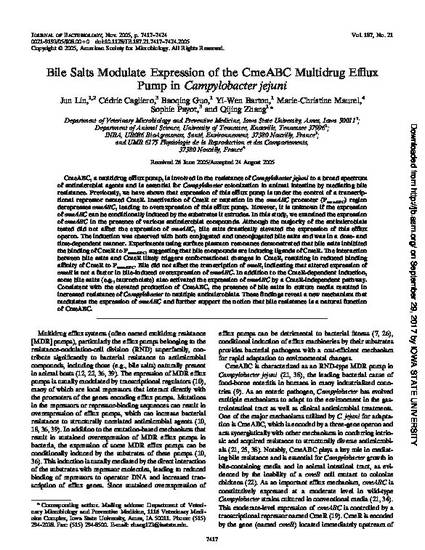
Article
Bile Salts Modulate Expression of the CmeABC Multidrug Efflux Pump in Campylobacter jejuni
Journal of Bacteriology
Document Type
Article
Disciplines
Publication Version
Published Version
Publication Date
11-1-2005
DOI
10.1128/JB.187.21.7417-7424.2005
Abstract
CmeABC, a multidrug efflux pump, is involved in the resistance of Campylobacter jejuni to a broad spectrum of antimicrobial agents and is essential for Campylobacter colonization in animal intestine by mediating bile resistance. Previously, we have shown that expression of this efflux pump is under the control of a transcriptional repressor named CmeR. Inactivation of CmeR or mutation in the cmeABC promoter (PcmeABC) region derepresses cmeABC, leading to overexpression of this efflux pump. However, it is unknown if the expression of cmeABC can be conditionally induced by the substrates it extrudes. In this study, we examined the expression of cmeABC in the presence of various antimicrobial compounds. Although the majority of the antimicrobials tested did not affect the expression of cmeABC, bile salts drastically elevated the expression of this efflux operon. The induction was observed with both conjugated and unconjugated bile salts and was in a dose- and time-dependent manner. Experiments using surface plasmon resonance demonstrated that bile salts inhibited the binding of CmeR to PcmeABC, suggesting that bile compounds are inducing ligands of CmeR. The interaction between bile salts and CmeR likely triggers conformational changes in CmeR, resulting in reduced binding affinity of CmeR to PcmeABC. Bile did not affect the transcription of cmeR, indicating that altered expression of cmeR is not a factor in bile-induced overexpression of cmeABC. In addition to the CmeR-dependent induction, some bile salts (e.g., taurocholate) also activated the expression of cmeABC by a CmeR-independent pathway. Consistent with the elevated production of CmeABC, the presence of bile salts in culture media resulted in increased resistance of Campylobacter to multiple antimicrobials. These findings reveal a new mechanism that modulates the expression of cmeABC and further support the notion that bile resistance is a natural function of CmeABC.
Copyright Owner
American Society for Microbiology
Copyright Date
2005
Language
en
File Format
application/pdf
Citation Information
Jun Lin, Cédric Cagliero, Baoqing Guo, Yi-Wen Barton, et al.. "Bile Salts Modulate Expression of the CmeABC Multidrug Efflux Pump in Campylobacter jejuni" Journal of Bacteriology Vol. 187 Iss. 21 (2005) p. 7417 - 7424 Available at: http://works.bepress.com/qijing-zhang/62/

This article is published as Lin, Jun, Cédric Cagliero, Baoqing Guo, Yi-Wen Barton, Marie-Christine Maurel, Sophie Payot, and Qijing Zhang. "Bile salts modulate expression of the CmeABC multidrug efflux pump in Campylobacter jejuni." Journal of bacteriology 187, no. 21 (2005): 7417-7424. doi: 10.1128/JB.187.21.7417-7424.2005. Posted with permission.